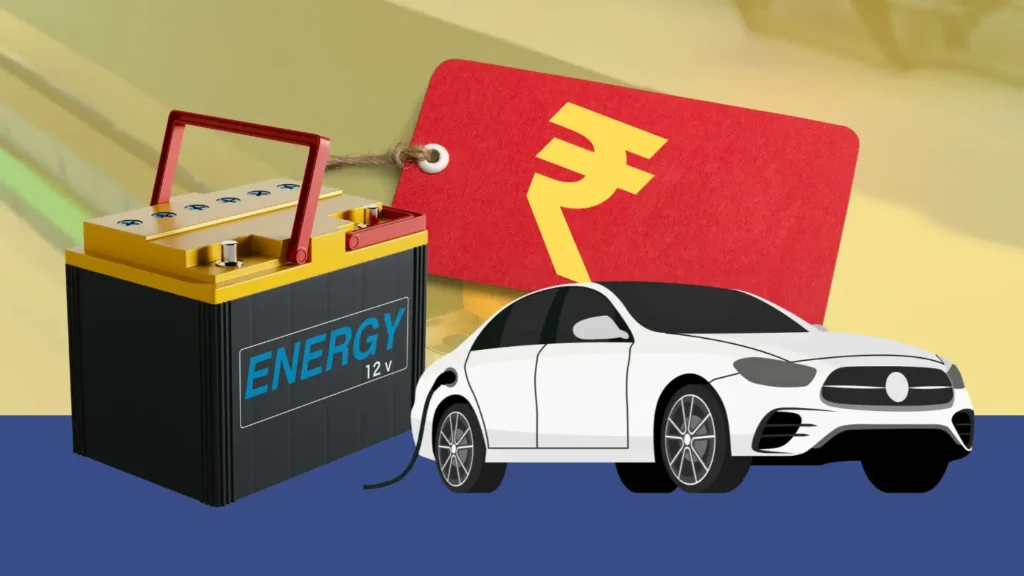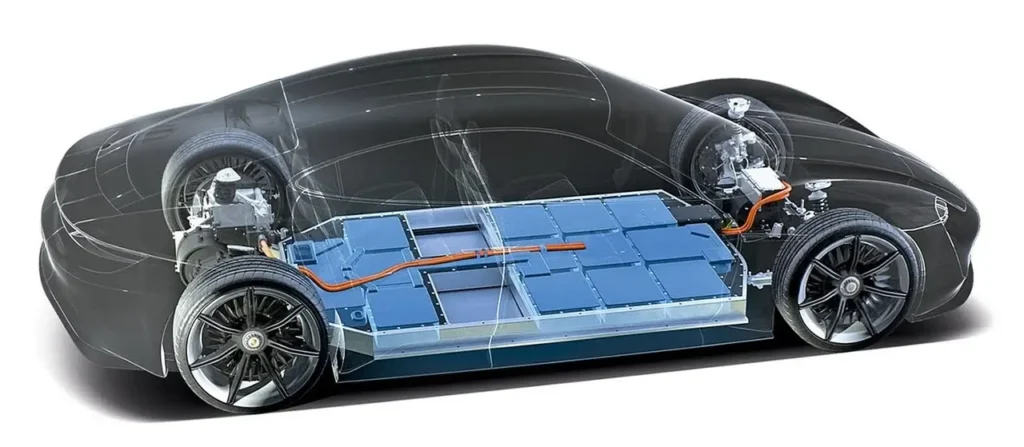
Key Points
- EV battery costs in India range from ₹15,000 to ₹20,000 per kWh on average.
- For a typical 30kWh battery, replacement cost is around ₹4,50,000 to ₹6,00,000.
- Some models, like the Tata Nexon EV, may cost more, with reported replacement at ₹7,00,000 for 30kWh.
The cost of an EV battery in India depends on the battery’s capacity and the specific vehicle model.
On average, the cost is about ₹15,000 to ₹20,000 per kilowatt-hour (kWh).
For example, a common EV with a 30kWh battery might cost between ₹4,50,000 and ₹6,00,000 to replace.
However, actual costs can vary, and some models like the Tata Nexon EV have higher replacement costs, reported at ₹7,00,000 for its 30kWh battery, which is surprisingly higher than the general range.
Factors Affecting EV Battery Cost?
Costs can differ due to the manufacturer, battery type (e.g., LFP vs. NMC), and additional fees like labour and taxes.
It’s also worth noting that battery prices are expected to decrease over time due to technological advancements and falling raw material costs.
Understanding EV Battery Costs in India
 Electric vehicle (EV) battery costs in India are a critical factor for potential buyers and owners, influencing both initial purchase decisions and long-term ownership expenses.
Electric vehicle (EV) battery costs in India are a critical factor for potential buyers and owners, influencing both initial purchase decisions and long-term ownership expenses.
This survey note provides a comprehensive analysis of the costs, drawing from various sources and specific model examples to offer a detailed understanding.
General Cost Estimates
Research indicates that the average cost of an EV battery pack in India ranges from ₹15,000 to ₹20,000 per kilowatt-hour (kWh).
This estimate is supported by multiple sources, including Thunderplus Blog and E-Vehicle Info, which suggest this range as a baseline for replacement costs.
For instance, a 30kWh battery, common in many Indian EVs, would cost between ₹4,50,000 and ₹6,00,000, while a 40kWh battery could range from ₹6,00,000 to ₹8,00,000.
Specific Model Analysis
To provide concrete examples, we examined several popular EV models in India and their reported battery replacement costs:
-
- Tata Nexon EV: This model offers battery capacities of 30kWh (standard) and 40.5kWh (long-range). A reported replacement cost for the 30kWh battery is ₹7,00,000, as noted in E-Vehicle Info, equating to approximately ₹23,333 per kWh. This is higher than the general estimate, possibly due to brand-specific pricing or additional components included in the pack.
-
- MG ZS EV: With a 44.5kWh battery, the replacement cost is reported to range from ₹6,60,000 to ₹8,50,000, according to E-Vehicle Info. This translates to approximately ₹14,831 to ₹19,101 per kWh, aligning closely with the general range.
-
- Mahindra XUV400: Available in 34.5kWh and 39.4kWh options, one source (allservicecost.com) suggests a replacement cost of ₹5,00,000 for the 39.4kWh battery, equating to ₹12,689 per kWh. However, this figure seems low compared to others and may not be fully accurate, warranting further verification.
These examples highlight variability, with the Tata Nexon EV showing a higher per-kWh cost, possibly due to its use of Lithium Iron Phosphate (LFP) batteries, which, despite being cheaper in raw materials globally, may have higher replacement costs in India due to import and assembly factors.
EV Battery Type and Cost Implications
The type of battery significantly impacts cost. LFP batteries, used in models like the Tata Nexon EV, are generally cheaper in terms of raw materials compared to Nickel Manganese Cobalt (NMC) batteries, which are used in models like the Ola Electric Scooter (as per E-Vehicle Info).
However, replacement costs in India can be influenced by local manufacturing, import duties, and brand pricing strategies.
For instance, the Ola S1 Pro’s 4kWh battery replacement cost is around ₹87,298, or ₹21,824.5 per kWh, which is higher than car battery estimates, reflecting differences in scale and technology for two-wheelers.
International Comparisons and Future Trends
Internationally, EV battery pack costs have been declining, with reports like BusinessToday noting a drop to $78 per kWh as of September 2024, equating to about ₹6,474 per kWh at current exchange rates (1 USD ≈ 83 INR).
This is significantly lower than Indian estimates, suggesting that local costs include additional factors like taxes and import duties.
Future projections, such as Goldman Sachs’ prediction of battery prices falling to ₹8,000 per kWh by 2025, indicate potential cost reductions, which could lower replacement costs in India over time.
Methodological Considerations
The analysis involved web searches for general cost estimates and specific model data, using platforms like IndiaMART for supplier prices and automotive forums like Team-BHP for user experiences.
Discrepancies, such as the Mahindra XUV400’s low reported cost, highlight the need for official manufacturer data, which is often not publicly available. The survey also considered factors like battery size, brand, and regional price variations, as noted in Thunderplus Blog.
Table: EV Battery Replacement Costs for Popular Models
| Model | Battery Capacity (kWh) | Reported Replacement Cost (₹) | Cost per kWh (₹) |
|---|---|---|---|
| Tata Nexon EV | 30 | 7,00,000 | 23,333 |
| MG ZS EV | 44.5 | 6,60,000 – 8,50,000 | 14,831 – 19,101 |
| Mahindra XUV400 | 39.4 | 5,00,000 (tentative) | 12,689 |
Note: The Mahindra XUV400 cost may require further verification due to potential inaccuracies.
Final Thoughts
The cost of EV batteries in India, averaging ₹15,000 to ₹20,000 per kWh, reflects a balance between global trends and local economic factors. Specific models may deviate, with the Tata Nexon EV showing higher costs possibly due to LFP battery pricing in the Indian market.
As battery technology advances and production scales up, costs are expected to decrease, making EVs more accessible. For precise costs, consulting authorized service centres is recommended, given the variability observed.
The post EV Battery Cost India 2025: Price per kWh & Replacement Cost appeared first on E-Vehicle Info.















